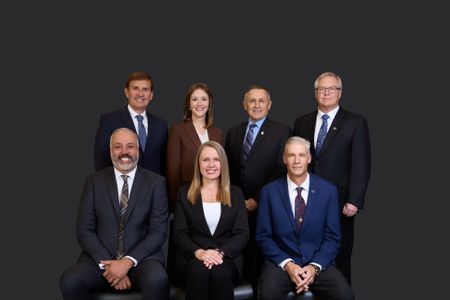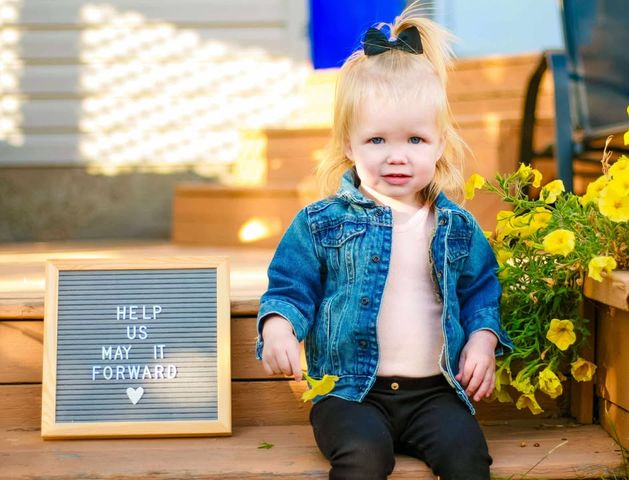Local News
May It Forward: Turning grief into purpose in Airdrie
An Airdrie mother is turning grief into purpose through May It Forward – a community effort born from the loss of her daughter, May, and tied to Pregnancy and Infant Loss Awareness Month. In her written responses, Cathy Provencher said October carries deep personal meaning. “October is Pregnancy and Infant Loss Awareness Month – a time to honour the babies gone too soon, and the parents who live with the ache of their absence every single day,” she wrote. “Our daughter, May, was born on May 5, 2025 – her heartbeat had stopped weeks earlier without our knowing. Losing her shattered our world and changed us forever.” Her account, shared in writing with Discover Airdrie, traces the loss from a routine ultrasound to the creation of May It Forward – an initiative now echoing across Airdrie during Pregnancy and Infant Loss Awareness Month. Provencher and her husband, Cody, had already welcomed their first-born, Sophie. She said the couple entered their second pregnancy “with ease and excitement.” “Every appointment was perfect, every scan reassuring,” she wrote, “You know it happens to other people, but you never think it could happen to you. And when it does – you become the statistic no one wants to be.” “When we learned that May’s heart had stopped after a routine checkup and ultrasound, our world went silent,” she continued. “We were at the end of the 16-week mark at the appointment, and I was seventeen weeks along when I delivered our sweet May. We later learned she had passed between 14–15 weeks – something called a ‘missed miscarriage,’ when your body doesn’t yet realize the pregnancy has ended.” “You’re told that after 12 weeks, you’re in the ‘safe zone,’ ” she wrote. “The truth is, loss can happen at any stage – and when it does, it’s not just a medical event, it’s a soul-level rupture.” “Laying on that ultrasound table and expecting to hear her heartbeat, and instead learning that it had stopped, changed me,” she said. “It’s a kind of silence that changes you forever.” “Delivering May was both sacred and devastating,” Provencher said in her written account. “Because of how far along I was, I was advised to naturally deliver instead of having a D&C. It was my choice, and I was told that a natural delivery carried fewer risks.” “It’s something you never imagine having to decide – how to bring your baby into the world after learning their heart has stopped,” she added. “I’m grateful that Cody and I got to hold her, sing to her, pray with her, and tell her how deeply loved she was. Meeting your child and saying goodbye in the same breath is a pain I would never wish on anyone.” At the hospital, the obstetrician (OB) who supported her through delivery told her she had experienced a miscarriage at a similar gestation. “She said something I’ll never forget: ‘Miscarriages are common, even after 12 weeks – they’re just not talked about,’ ” Provencher wrote. “She urged me to share my story. And I have, ever since.” Provencher said that when she began sharing her experience, the response was immediate. “I didn’t want to make people uncomfortable or sad, but when I opened up on social media or in person, the number of messages Cody and I received from others who had experienced similar losses was overwhelming,” she wrote. “It was shocking – and heartbreaking – to see how many families move through this in silence, feeling isolated and alone.” Out of that silence came the first steps toward naming the daughter she and Cody had lost. Naming May “When we found out about the loss, Cody and I were scrambling for names in the midst of our shock,” she wrote. “We hadn’t picked one yet – we had a list of possibilities on our phones from when we daydreamed about her arrival in the fall. We hadn’t found out the gender yet; we were waiting for our 18-week ultrasound. Cody thought of ‘May,’ to honour the month she was born, if it was a girl.” “When I delivered, the doctors thought the baby might be a boy (it was too early to tell), so we chose to believe that the baby was a boy and named our baby Mason,” she continued. “Later, when we learned she was indeed a girl through her autopsy results, it brought a new wave of grief. Knowing what it feels like to raise a daughter made the ache even sharper.” “We ultimately chose the name May Mason Provencher – her middle name, a nod to her welcome into this world,” she wrote. Leaving the hospital, Provencher said, was “one of the hardest moments of my life.” “There is a deep ache that comes from leaving your baby behind in a hospital room when every part of your body is screaming to bring them home,” she wrote. “Nothing prepares you for the silence after loss – the quiet house, the still body, the way your arms ache for a baby who isn’t there. The pain is not only emotional; it’s physical, spiritual, and cellular.” “I never realized that I would still go through the postpartum period after a miscarriage,” she added. “With my first daughter, Sophie, postpartum came with exhaustion and sleepless nights, but it was softened by the warmth of her in my arms. With May, I experienced the same physical process – my hormones crashed, I did everything I could to avoid my milk coming in, and my body tried to recover like it does after a live birth – but there was no baby to balance any of it. The emptiness made every physical change feel cruel. Your mind starts to feel like it’s betraying you; you wonder if you’re going insane, because you’re feeling all the symptoms of new motherhood with no child to hold.” “Delivering May also showed me how similar – and how painfully different – a miscarriage can be from a typical birth,” she wrote. “With how far along I was, the process to bring her into the world was highly suggested to be natural labour and delivery. I had the same contractions, the same pain, the same physical endurance it took to bring Sophie into the world – but this time, the outcome was heartbreak. There were no monitors tracking her heartbeat, no reassuring beeps filling the room.” “For months, my whole life had revolved around keeping her safe – avoiding certain foods, monitoring every symptom – and suddenly I was told that nothing I did or didn’t do mattered anymore,” she wrote. “I could take any medication, because it wouldn’t affect the baby. That shift – going from protecting life to managing loss – was devastating.” “Instead of the radiant, warm bassinet we had placed Sophie in after she was born, there was a cooling cot for May,” she wrote. “Instead of joyful cries, there was silence. Living through both a healthy birth and a birth filled with loss broke something in me that will never fully mend.” “And yet, even in that darkness, there was light,” she wrote. “The nurses and doctors who cared for us were extraordinary. They treated May with tenderness and spoke to her as if she mattered – because she did. Their compassion helped me survive one of the worst moments of my life, and I will never forget them.” Transforming grief into purpose: May It Forward “When we first found out I was pregnant, we learned that May’s due date was October 13 – Thanksgiving Day,” Provencher wrote. “It felt so symbolic: a day about gratitude, family, and new beginnings. After our loss, that same date became something I dreaded. Watching the seasons change – spring, summer, and then fall – felt like watching time move further away from her.” “As October approached, I knew I couldn’t let that day pass in silence,” she wrote. “I didn’t want October 13 to be only a day of grief. I wanted to change the narrative – to transform what would have been one of the hardest days (and the month of October) into something that could hold beauty, connection, and meaning. May It Forward was born out of that desire: to honour May’s life through acts of kindness, love, and generosity.” “This loss took away my sense of control over everything – my body, my emotions, even time itself,” she wrote. “I can’t control what happened, but I can control how I honour her. Each act of kindness through May It Forward, each conversation that keeps her name alive, reminds me that love can still move through me, even when everything else feels broken. May It Forward is my way of saying: even though she’s not here, her life still creates ripples of goodness in the world.” “It’s been incredibly moving to see how people have embraced the idea,” she added. “Many friends and family have done acts of kindness in May’s name.” “Many have donated to the Pregnancy and Infant Loss Support Centre (PILSC) in May’s honour,” she wrote. “One of my friends said something that really touched me: ‘It feels good to know that my donation might help fund a future counselling session for you, Cody, or another grieving family.’ That full-circle kindness means everything.” “Others have paid for a stranger’s groceries, or covered someone’s coffee and treat order in the Starbucks drive-thru here in Airdrie,” she said. “Every story reminds me that May’s life, though short, continues to spark compassion in others. That’s all I could ever hope for.” A lifeline and a fight for funding Seeking connection, Provencher began reaching out to others who had spoken publicly about pregnancy loss. Those conversations led her to the organization that would become central to her family’s healing. “The Pregnancy and Infant Loss Support Centre (PILSC) has been a lifeline for us,” she wrote. “Early on, I reached out to other moms who had bravely shared their stories of loss. They were the ones who urged me to contact PILSC, and when I finally did, I was amazed by the depth of support they offered.” “Cody and I have both received individual therapy, couples counselling, and joined separate grief groups – all through PILSC,” she wrote. “Every session has been free of charge; there’s no way we could have financially kept up with the amount of therapy we’ve utilized. They sent us a grief care box filled with comforting items that made us feel seen and held.” “Just one month after our loss this past June, we attended their annual Pregnancy and Infant Loss Legacy Run and Walk in Nose Creek Park here in Airdrie,” she wrote. “PILSC had made a sign with May’s name on it and placed it thoughtfully along the walking route. Walking that path surrounded by other families honouring their babies was incredibly moving. Seeing how many names were displayed on the route – how many tiny lives are loved and remembered – was both heartbreaking and healing. And a visual representation to see how many families truly are impacted by this type of loss.” “Our therapist with PILSC has been transformative and has supported us through some dark moments,” she wrote. “Miscarriage impacts marriages in profound ways, which I did not expect. Grief shows up differently for each partner, and we’ve learned how to communicate and support each other with our therapist’s help.” “Parenting with loss is another layer to navigate,” she added. “Parenting your living child while grieving the one you’ve lost is one of the hardest things imaginable. PILSC gave us the tools and grace to navigate that.” “My heart sank,” Provencher wrote. “To think that an organization doing such vital, life-saving work is losing 25 per cent of its funding feels incomprehensible. PILSC has been absolutely essential to our healing – not just for us, but for countless families across Alberta.” “For many of us, PILSC is the reason we’re still standing,” she said. “It’s not just numbers on a budget line – it’s therapy sessions that won’t happen, families who won’t get the help they need, and parents who might feel even more invisible in their grief.” “Pregnancy and infant loss often exist in silence, and funding cuts like this reinforce that silence,” she wrote. “Miscarriage can feel like invisible pain, and cuts like this make families feel even more unseen. Our province can and should do better for families navigating one of the hardest experiences imaginable.” Her concern reflects what the Centre itself reported publicly this fall. According to a Sept. 18, 2025 news release from the Pregnancy and Infant Loss Support Centre (PILSC), government grants for the organization came to “a surprise end earlier this year.” The release said demand for counselling, peer groups and coaching has “more than doubled in the past year.” “In 2024, PILSC supported 103 unique clients through nearly 2,800 points of contact and more than 1,400 volunteer hours. By the end of July 2025, the Centre had already supported 211 unique clients – more than double the total for all of last year – and logged 2,510 points of contact, putting it on pace to exceed 2024’s record before year-end,” the release stated. In the same release, PILSC announced the opening of a new 3,500-sq.-ft. Calgary location at 14505 Bannister Rd., Unit 102, Calgary. The Centre said the site includes dedicated counselling rooms for parents and families, group spaces for peer support and memorial gatherings, and quiet areas for reflection and healing practices. The release described the opening as “both a celebration of what has been built – and an invitation for the community to help ensure these doors stay open for grieving families.” While the numbers tell one side of the story, Provencher said the deeper truth is lived in daily life. Living alongside loss “Grief after pregnancy loss is layered,” Provencher wrote. “It’s not only the baby you lose, but also the version of yourself you were when you believed everything would turn out okay. You lose the innocence of pregnancy – the ability to assume that a heartbeat means safety. You lose the future you had planned, the sibling bond you envisioned, and the milestones you’ll never get to see.” “This journey has taught me that grief and love are the same thread – one cannot exist without the other,” she continued. “Talking about May, honouring her, and helping other families do the same has given my pain a purpose. I will never stop missing her, but I am learning to live alongside the grief instead of fighting it.” “Cody and I have since connected with other mothers and fathers who’ve experienced loss at every stage – early, mid, full-term and even after birth,” she wrote. “The strength of the women I’ve met and bonded with who have this shared loss inspires me every day. We’ve all lived through our worst-case scenarios, and we’re still standing. That makes us the strongest women I know.” Sophie’s way of remembering “We talk about May all the time – Sophie knows she has a baby sister in heaven,” Provencher wrote. “After our loss, we planted sunflower seeds and mint in May’s honour. Watching them grow this summer has been a gentle, healing reminder that life continues to bloom even in grief. Sophie loves helping me water the plants; it’s become our little ritual together.” “Explaining loss to a young child is incredibly hard, and it’s something no parent should ever have to do,” she wrote. “Sophie knew there was a baby in my tummy, so trying to explain that there wasn’t anymore broke my heart. You don’t just lose a baby; you lose the future you imagined – the sibling bond, the laughter, the milestones, the family dynamic you dreamed of. May was meant to be a sister, a granddaughter, a niece. There’s an emptiness that ripples out in every direction.” “Every October, we’ll May It Forward in honour of May,” she said. “My hope is that Sophie grows up understanding what it means to turn pain into purpose – and carries that forward into her own life.” A call for compassion “I hope people realize how common pregnancy and infant loss truly are – and yet how rarely we talk about it,” Provencher wrote. “When we lost May, I felt like the world kept moving while ours stopped. I didn’t know how many others had walked this path until I started speaking out. And once I did, people came forward with their own stories. It reminded me that grief is everywhere – we just need the courage to talk about it.” “I want May’s story to remind people that every life, no matter how brief, has meaning,” she said. “That love doesn’t end when a heartbeat stops. And that something beautiful can still be born from heartbreak.” “If May It Forward inspires even one person to extend compassion – whether that’s through a small act of kindness, a donation to a loss organization, or simply checking in on a friend who’s grieving – then May’s life has made an impact,” she added. “That’s her legacy.” Continuing May’s legacy “If anyone would like to May It Forward and share with our family what you’ve done, we would be so appreciative,” Provencher wrote. “Feel free to share on social media with the hashtag #MayItForward.” She said the Pregnancy and Infant Loss Legacy Run and Walk is scheduled in Airdrie on June 27 next year, and that companies who want to get involved or sponsor it can email info@pilsc.org. “For Provencher, those small acts have become a promise to herself – proof that love can move forward even when life cannot.” “I can’t change what happened to us, but I can choose what comes next,” she wrote. “May It Forward is how I turn pain into purpose – one small act of kindness at a time, in memory of the little girl who changed everything.” Sign up to get the latest local news headlines delivered directly to your inbox every afternoon. Send your news tips, story ideas, pictures, and videos to news@discoverairdrie.com. You can also message and follow us on Twitter: @AIR1061FM. DiscoverAirdrie encourages you to get your news directly from your trusted source by bookmarking this page and downloading the DiscoverAirdrie app. To hear more on this story and others, stream us live here.






